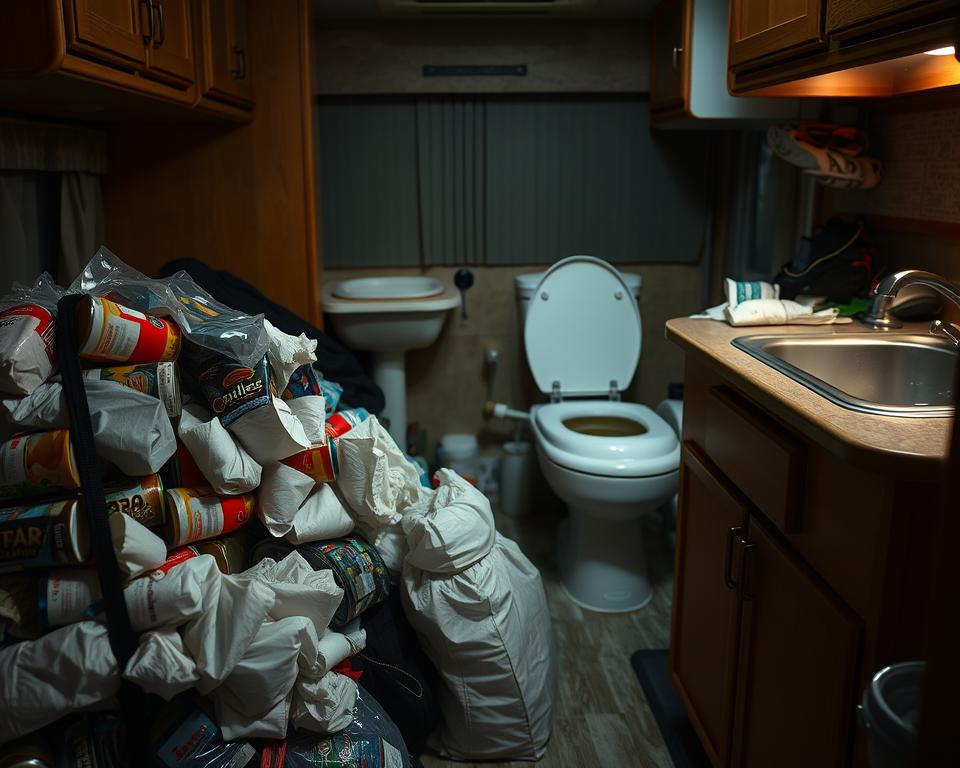Motorhome Tank Emptying: A Manual to Easy Disposal
Did you ever consider how your camper handles sewage during outdoor getaways? RV septic pumping is crucial, perhaps more than you realize. It’s vital to have your motorhome’s waste system working well for seamless journeys. This guide explains RV waste systems, the need for septic pumping, and top tips for stress-free excursions. With All in Sanitation’s expertise in RV grey water pump, you can focus on exploring, not emptying tanks.
Significant Notes
- Understanding RV waste systems is crucial for efficient RV septic pumping.
- Regular septic pumping prevents unpleasant surprises during your travels.
- Following tips prolongs your motorhome’s pipework lifespan.
- Count on All in Sanitation for trustworthy camper tank services.
- Monitoring tank levels guarantees a smooth RV adventure.
- Proper wastewater disposal is key to responsible RV ownership.
Comprehending RV Sewage Infrastructure
RV waste systems are essential for efficient waste management on the road. They include black and gray water tanks. The black tanks collect toilet waste. Gray water tanks manage dish and shower runoff. Understanding how each tank works enhances your disposal process.
Proper upkeep of these components is crucial. Neglecting scheduled emptying may result in blockages. Potentially ruining your outdoor excursions. Perform routine inspections to maintain optimal performance.
Using a dependable black water service is key for proper tank emptying. Specialized RV treatments extend tank longevity and prevent odors. Proper care of your waste system boosts your RV experience significantly.
Why RV Septic Pumping is Essential
Routine septic service ensures a clean and efficient RV. Ignoring tank emptying can cause odors, clogging, and costly repairs. Waste buildup is a health hazard due to bacteria and contamination. Keeping up with maintenance is thus crucial.
Using a professional service like All in Sanitation ensures eco-friendly waste disposal. Their expertise guarantees safe, efficient handling of your waste. Regular septic system care prolongs your travel joys without waste concerns. It ensures your road trips remain enjoyable, avoiding the dangers of overlooked RV septic pumping.
How Often Should You Pump Your RV Septic?
How often you empty tanks influences your RV’s sanitation. It ensures your journey remains uninterrupted. Your pumping schedule depends on occupancy, tank capacity, and usage patterns.
For occasional RV users, it’s best to pump the black water tank every 3-5 days. Full-time RV dwellers might need to pump more often due to more waste. Keeping an eye on your gauge refines your servicing schedule.
Chemical treatments are useful for determining when to pump. By adhering to these disposal recommendations, RV owners can effectively safeguard their systems. Avoiding overflows preserves your RV’s plumbing and cleanliness.

RV Waste Emptying Techniques
RV owners have multiple dumping methods at their disposal. Maceration uses a pump to liquefy solids to transform waste into liquid sludge. It enables smooth transfers to dump points. Its efficiency and convenience make it a popular choice.
Residential dumping routes your RV waste into your home septic. It’s essential to verify local regulations to avoid non-compliance with waste disposal laws. Properly executed, it’s eco-friendly and compliant.
Gravity-fed dumping relies on height difference to empty tanks. All dumping options have advantages and drawbacks. Knowing the differences helps you pick the right approach for clean and efficient disposal.
RV Septic Pumping Equipment and Tools
Proper equipment makes tank emptying easier. A top-notch sewer hose is vital for connecting your RV’s waste tank to the dump station. It must be both durable and flexible for easy maneuvering. A good sewer hose simplifies waste disposal, making it less of a hassle.
Macerator pumps are also essential in the equipment lineup. These devices liquefy solid waste into a fine slurry, facilitating smoother transfers. Ideal for low-lying dump points.
Keep your waste tools in top condition. Always clean hoses and tools post-use to avoid contamination. Storing them neatly ensures they’re always ready for use. Taking care of your equipment guarantees hygiene and efficiency during disposal tasks.
Best Practices for RV Sewer Cleaning
A tidy waste setup makes camping more enjoyable. Adhere to these tips for spotless sanitation. Dump black tanks before gray to optimize rinsing. This process uses the cleaner water to flush out the tanks, preventing clogs and buildup.
It’s essential to use bacteria and enzyme treatments for effective wastewater management. These treatments naturally break down waste, fostering a healthier septic environment. Stay away from harsh chemicals as they can kill the beneficial bacteria, reducing the system’s effectiveness.
Regular rinsing prevents odor and debris buildup. Employing a dedicated sewer hose for black water use is a wise choice. It minimizes contamination risks and aids in maintaining system cleanliness.
To ensure best practices are consistently followed, adhere to this checklist:
- Dump black water first, then gray water.
- Use enzyme and bacteria treatments regularly.
- Skip bleach and strong disinfectants.
- Rinse tanks, hoses, and connectors after every use.
- Check valves and seals to catch leaks early.
By adopting these habits, campers enhance system longevity. Resulting in stress-free outdoor adventures.
Mobile Home Septic Maintenance
Similar to RVs, mobile homes need regular septic care for lasting performance. Regular upkeep prevents expensive repairs and guarantees a working septic system. A routine pump every 3–5 years suits most setups, based on usage and capacity.
Effective disposal methods are key to maintaining your septic system. Make sure to dispose of all waste and chemicals properly. Biodegradable solutions and level monitoring minimize harm. Harsh chemicals should be avoided as they harm the microbes that break down waste.
Arrange periodic expert check-ups to spot issues before they escalate. These check-ups ensure your peace of mind by identifying issues before they worsen, thus maintaining smooth operation. Following these guidelines keeps your home septic in peak shape.
Camper Waste Dumping Advice
Proper camper dump practices enhance travel comfort. Locate approved dumping spots before departure. Make sure these spots comply with local laws to avoid fines and environmental damage. Opting for RV-friendly products can enhance the tanks’ condition, facilitating efficient camper tank pumping.
Flushing with clean water helps clear tanks completely. Flushing tanks with water ensures complete emptying, averting the risk of waste residue. This residue can cause odors and blockages. Moreover, it supports an eco-friendly disposal method.
Advance planning is vital. By organizing your stops at disposal stations as per your travel plans, you can reduce hassle. This organization aids in streamlining the camper tank pumping process. Some useful tips for waste disposal include:
- Keep tabs on gauges to predict emptying times.
- Use bio-additives to accelerate breakdown and maintain tank health.
- Protect yourself with gloves and sanitization after handling equipment.
What You Need to Know About Holding Tank Treatments
Your RV’s sanitation system depends on effective tank treatments. These treatments are made with specific bacteria and enzymes. Designed to decompose solids efficiently. Using them regularly stops bad odors and ensures tanks stay clear, boosting overall performance.
Adding bio-treatments fosters a healthy septic ecosystem. They accelerate the natural decomposition process. This means you’ll need to pump out waste less often, extending your septic system’s lifespan.
Choose additives suited to your rig’s specs. Treatment options range widely. Opt for green, home-compatible formulas. These choices maximize disposal efficiency and system health.
| Treatment Form | Active Ingredients | Advantages |
|---|---|---|
| Liquid Formulas | Bacteria and enzymes | User-friendly; powerful decomposition |
| Powdered Solutions | Enzymes | Cost-effective; long shelf life |
| Tablet Treatments | Pre-measured cultures | Convenient; pre-measured dosages |
Septic Service Errors to Dodge
Campers often stumble on simple dumping mistakes. Skipping regular pumping leads to surprises. Resulting in overflow and malfunctions. Misusing cleaners harms beneficial bacteria. Leading to costly fixes and downtime.
Another common mistake is not following the correct order when dumping tanks. The sequence is crucial, especially for black water service. Failing to dump the black water before the gray can result in cross-contamination and foul odors. Avoid manual access to septic lids without professional help. Leave complex dumping tasks to experts for safety.
Moreover, neglecting equipment maintenance can cause leaks or clogs. Routine gear care supports clean, effective dumping. Avoiding these pitfalls simplifies your outdoor experience. And keeps campsites fresh and hygienic.
The Final Word
An in-depth guide on RV septic pumping is vital for RV or mobile home owners. They pave the way for hassle-free travels. Regular maintenance and understanding your waste system can enhance your travels significantly. Employing correct methods and gear ensures stress-free camping.
Choosing All in Sanitation for septic services grants tranquility. Their skilled team manages waste with precision and care. Allowing you to focus on memories, not maintenance.
Regular RV septic service is more than a mere task; it’s a cornerstone of responsible RV ownership. It combines the spirit of exploration with the assurance of a tidy, odor-free environment. Ensuring every road trip remains clean and enjoyable.
